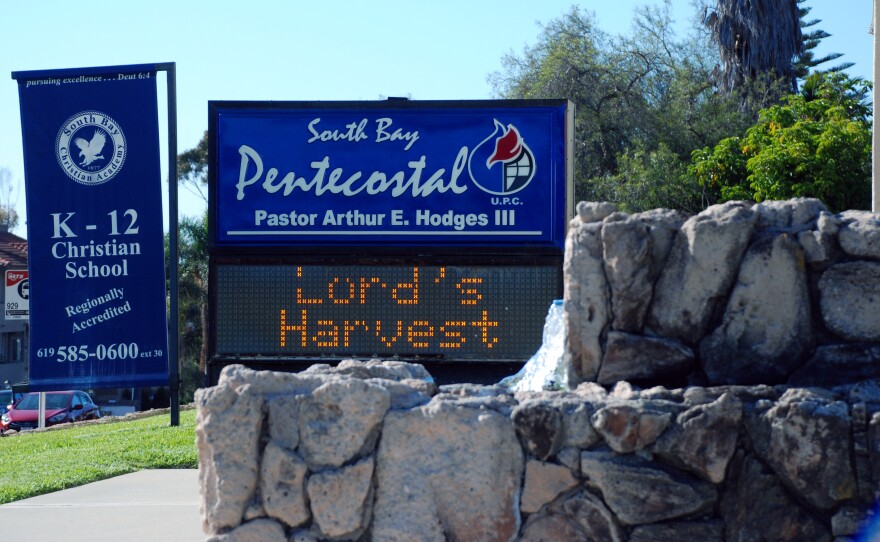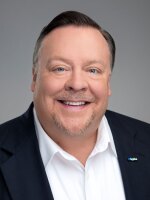On Friday, President Donald Trump announced from the White House that churches across the United States should be able to reopen right now. The announcement should come as welcome news to some churches, including one south bay congregation that’s suing Gov. Gavin Newsom to be able to hold services in their church once more.
Before we go any further, full transparency here. I am a member of a local Episcopal congregation. But since the onset of the COVID-19 pandemic, my church, along with all churches, mosques, synagogues and every other kind of house of worship in California, have fallen silent.
“When he (Newsom) did not announce churches in Phase 2, immediately we filed the lawsuit," said Bishop Arthur Hodges, lead pastor of South Bay United Pentecostal Church in Chula Vista.
Hodges said the people of his church, and members of every religious faith for that matter, are being discriminated against by the governor's public health orders.
He told KPBS that he wrote to the governor, talked to officials in his administration, and tried everything he could think of before resorting to a lawsuit. Hodges' lawsuit contends the governor’s orders violate his church’s constitutional rights
"You cannot use a pandemic to continue to abrogate our constitutional rights,” Hodges said.
He said it’s blatantly unfair that businesses of all sorts are allowed to operate, with restrictions, while churches must keep their doors closed. He cited a number of organizations: distribution centers, manufacturing facilities, and airlines.
“Why do they get a privilege that churches don’t get?" Hodges asked. "Airlines are not in the constitution. churches are.”
When Newsom issued the orders that forced the closure of churches and many businesses, the delineation was between what was considered essential, and what wasn’t. That in particular irked Hodges.
“Churches are essential. Churches are serving the needs of our community nobody else can serve. Churches serve a need in people’s lives and communities government cannot serve," the pastor said.
But as deeply committed as Bishop Hodges is to his viewpoint, other San Diego religious leaders are okay with the governor’s orders, at least for now.
"Like many people, I was heartbroken because it is hard for Christians to give up our worshiping life together,” said the Rt. Rev. Susan Brown Snook, the Bishop of the Episcopal Diocese of San Diego.
But, Snook said something more important is at stake, the health of the public, and she of cited another part of scripture to support her viewpoint.
“Jesus told us to love God and love our neighbors. Those are the commandments we follow and stopping in-person worship for a period of time is how we love our neighbors," she said.
Snook said there are other ways of exercising faith, and she wasn't just talking about Zoom meetings.
“Some of our churches are working on small group or home church structures, where people can come together in small churches in other places and build from there into a full gathering,” Snook said.
Hodges’ case is now before the 9th Circuit Court of Appeals. It’s being handled on an expedited schedule because it involves constitutional rights. Legal analyst Dan Eaton has been closely following the case.
“The question is whether in creating certain exceptions and not including religious services within those exceptions somehow offends the constitution, that’s really the critical issue here," Eaton said.
A recent ruling from the 6th District Court of Appeals on a similar case found that governors could not forbid outdoor, drive-in type services, but the ruling let stand the prohibition against gatherings in church buildings. Still, if the 9th goes against Hodges, then the case will head to the Supreme Court, which could decide not to take the case. That would let the 9th’s ruling stand. Or, they could take it, which Eaton said, would likely slow things way down.
"There's one thing everybody can agree with respect to coronavirus and the disease it causes, COVID-19, is that both are moving faster than the speed of law," said Eaton.
But the disagreements will likely remain. Where should the lines be drawn when it comes to the intersection between the right to freely exercise one’s faith, in a church building, and the risk that could pose to people of faith and those of no faith? One of many tough questions in the age of COVID-19.







